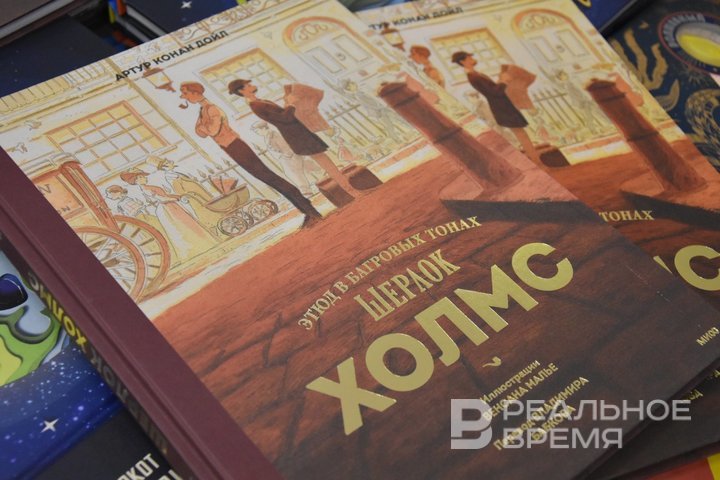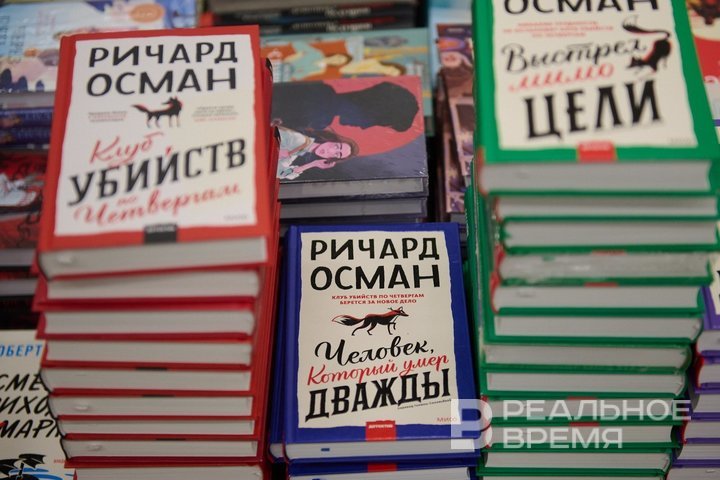Detective stories are a ‘great way of escapism’
Representatives of the book industry told us why we love detective stories so much

A grim Scandinavian noir, a cozy detective story set against a Scottish village backdrop, a high-tech Asian thriller, or an all-knowing detective unraveling mysteries on the streets of London. These are all detective stories. A literary genre that is suitable for any time of the year. Which is contraindicated to read before going to bed, since there is a high probability of not falling asleep at all. But which is so hard to break away from. Why do we love detective stories so much? Stroki book service discussed this with representatives of the book industry at the 26th International Non/Fiction Literature Fair.
The murderer is the butler!
Oddly enough, detectives are attracted by their predictability. The detective story is structured in such a way that the reader is guaranteed to get an understandable plot, an interesting course of investigation, and in the end he finds out who the killer was. Anastasia Khanina, a book producer and literary critic, called reading detective stories “a quick endorphin, a chocolate bar”. “I like the detective genre because with all the bloodshed that's going on there, it's a life-affirming story. In it, good in most cases wins over evil," Anastasia said.
Irina Ryabtsova, a publisher at the House of Stories and translator, shares a similar point of view, calling the detective story “the most idealistic genre”. Continuing with gastronomic associations, she compared detective stories to sunflower seeds. “One by one, you crack them open and get immense pleasure," added Ryabtsova.
Indeed, it's easy to “get hooked” on detective stories, as the reader quickly becomes immersed in the plot. Literally from the first pages. And given the time constraints, the reader wants to enjoy reading as soon as they have a free minute. But for all the predictability of detective stories, Tatyana Solovyova, the editor-in-chief of Alpina Proza publishing house, sees great scope for creativity in this genre: “There are quite a few pure genres now. There is always a mix: mystery detective, psychological detective, ironic detective, whatever else. On the one hand, we get what we want to get. On the other hand, we have the opportunity to find new things and enter the territory of the so-called great literature.”

Also, as Solovyova noted, detectives are “a cool way of escapism”. Philologist Alexandra Borisenko considers this an important function of detective stories. Such a peculiar escape from reality into the world of literature of order. “In difficult times, we also have a shortage of consolation, a shortage of faith in the light at the end of the tunnel. And the detectives tell us that everything will be fine, that evil will be punished," Borisenko explained. But then she stopped herself, noting that the Scandinavians and the Irish have mastered writing detective stories where everything is gloomy and not always ends well.
A little more than a detective
How can you distinguish a good detective from a bad one? Alexandra Borisenko believes that an important component of a fascinating detective story is an unexpected denouement or unexpected plot twists if the killer is known at the beginning of the book. In this case, it’s important to unravel the crime in an engaging way and show how the investigation unfolded and how the culprit was tracked down. The chain of investigation should be well-executed and leave no unanswered questions, according to Anastasia Khanina.
But the very atmosphere of the book is no less important. If you have a dark Scandinavian noir or the action takes place in northern Scotland, you should feel the cold. If you are holding a book in the dark academia genre, you should vividly imagine the interior of a secluded school where the crime took place. A combination of detailed investigation and a well-crafted atmosphere is precisely the formula for a successful detective story.
But not only that. It all depends on the reader. For example, Tatiana Solovyova prefers to get a little more than just a detective story. There is a downside to the conventionally predictable structure of classic detective stories. If you read too much, then at some point you can forget what happened in one book and what happened in another. “It makes me want to read a story where the author sets a goal with an asterisk. When an author has their own unique style, it leaves a lasting impression," said Solovieva.

A story with an asteriks can be attributed to the novels by Jo Nesbø about the detective from the Oslo Police Department, Harry Hole. Or Peter Høeg's novel Smilla and Her Feelings for Snow, which can be classified not only as a detective story but also as a psychological and ethnographic novel. Such books include the works of Swiss writer Joël Dicker. With all the predictability of the genre, Dicker will offer the reader 15-20 versions of the crime, each of which we will be as sure as the back of our hand. But in the end, it won't be like that at all. And Yulia Yakovleva and Alexey Oleynikov offer the reader not only an investigation with an understandable detective component, but also a Russian cultural background with references to classical literature, cinema and popular culture.
From Sherlock to cupcakes
The detective genre gained universal love after the publication of The Adventures of Sherlock Holmes by Arthur Conan Doyle in 1892. The personality of the charming detective and an extraordinary man aroused interest among readers. It was an important part of detective stories in the time of Conan Doyle. At the same time, at the end of the 19th and beginning of the 20th century, the detective remained in the same condition, age, and did not change at all. Although a series of stories about him could have been published for 30 years. In modern detective fiction, it is customary to talk about a double act. In addition to the crime, the reader's attention is focused on the investigator's personal problems. He falls in love, gets divorced, gets sick, builds relationships with friends or relatives, and eventually gets old.
As in any major genre, detective stories eventually developed subgenres that were popular, then “died”, then moved to other formats. For example, at one time the genre of judicial drama was popular. It emerged from a detective story where all the action took place in the courtroom. Nowadays, such stories are more often seen in the format of a TV series than in the book version. There have emerged rogue-style detective stories where the focus is placed on the criminal’s personality. In social detective stories (often found among Scandinavians), social issues play a significant role, acting as catalysts for crime.

Alexandra Borisenko believes that the detective has returned to its roots — the industrial narrative. “A profession of a detective emerged, new methods of finding criminals, and an interest in professional life. That's why we see a lot of procedures: what does an investigator do in the first place, how does the medical examiner work at the crime scene, what is being studied by criminologists. The detective story has become a production novel again," Borisenko said.
But this format is not the only popular one. Readers once again wanted Miss Marple's investigative stories with her tea party, beautiful garden and cozy house in the English wilderness. And if a detective story is an escapist genre, then a cozy detective story is the peak of escapism. In cozy detective stories, the action takes place in a beautiful village, a coffee shop, a bookstore, or any other place where you want to stay, wrap yourself in a blanket and never leave. And in such a cozy corner, a terrible murder takes place, which is no longer being investigated by a detective, but by an old woman, a housewife, or a completely inconspicuous person. That is, an amateur. This character usually has to be not only a pleasant character, but also a first-class psychologist.
The love of cozy detectives in Russia, and indeed all over the world, began with Richard Osman's book “The Thursday Murder Club”. And recently, Peter Boland's detective novel “Murders and Cupcakes” had the same effect. Boland said that he used to write books for teenagers, but publishers strongly requested a cozy detective story. And if books for teenagers were not such a resounding success, then everything worked out with Boland's cozy detectives.
Anastasia Khanina noted that this subgenre has two distinctive features: a simple, uncomplicated narrative without complicated twists and attention to everyday life. “In Richard Osman's 'The Thursday Murder Club,' perhaps 30% of the book is devoted to the characters leisurely dining, how conversations unfold over food. This is an important part of cozy books. This everyday detail feels somewhat comforting, like being wrapped in a soft blanket," added Khanina.

Another popular subgenre is historical or retrodetective. According to Tatiana Solovyova, writers love this direction. The thing is that it is quite difficult to build a fascinating investigation in modern realities. There are cameras all around, everyone has mobile phones. Any action can be tracked. All this makes it possible to solve even a complex crime fairly quickly, which means that building a convincing detective story becomes not only an impossible task, but a very, very difficult one.
“A historical detective story is a way to create an atmosphere and an understandable world, not by inventing it, but by taking a ready-made built-up space with rules and a system. Moreover, most of the time this world is well recognised by readers," Solovyova said. But then everything becomes much more difficult for the writer — he needs to come up with a charming hero who will appeal to modern readers, but match the time in which the main action of the detective unfolds.
According to all participants in the discussion, detectives will not lose their popularity in 2025. Most likely, the trend towards cozy crime stories will continue, as well as cross-genre development, when the reader finds in the story not only a detective story, but also elements of other literary genres. Irina Ryabtsova suggested that in the near future detective stories will go beyond the boundaries of paper media. They will become elements of computer games or part of an interactive format, where the reader or viewer will determine the development of the plot in a book or series.
Ekaterina Petrova — a literary reviewer for Realnoe Vremya online newspaper, author of Poppy Seed Muffins Telegram channel, founder of the first online subscription book club Makulatura.